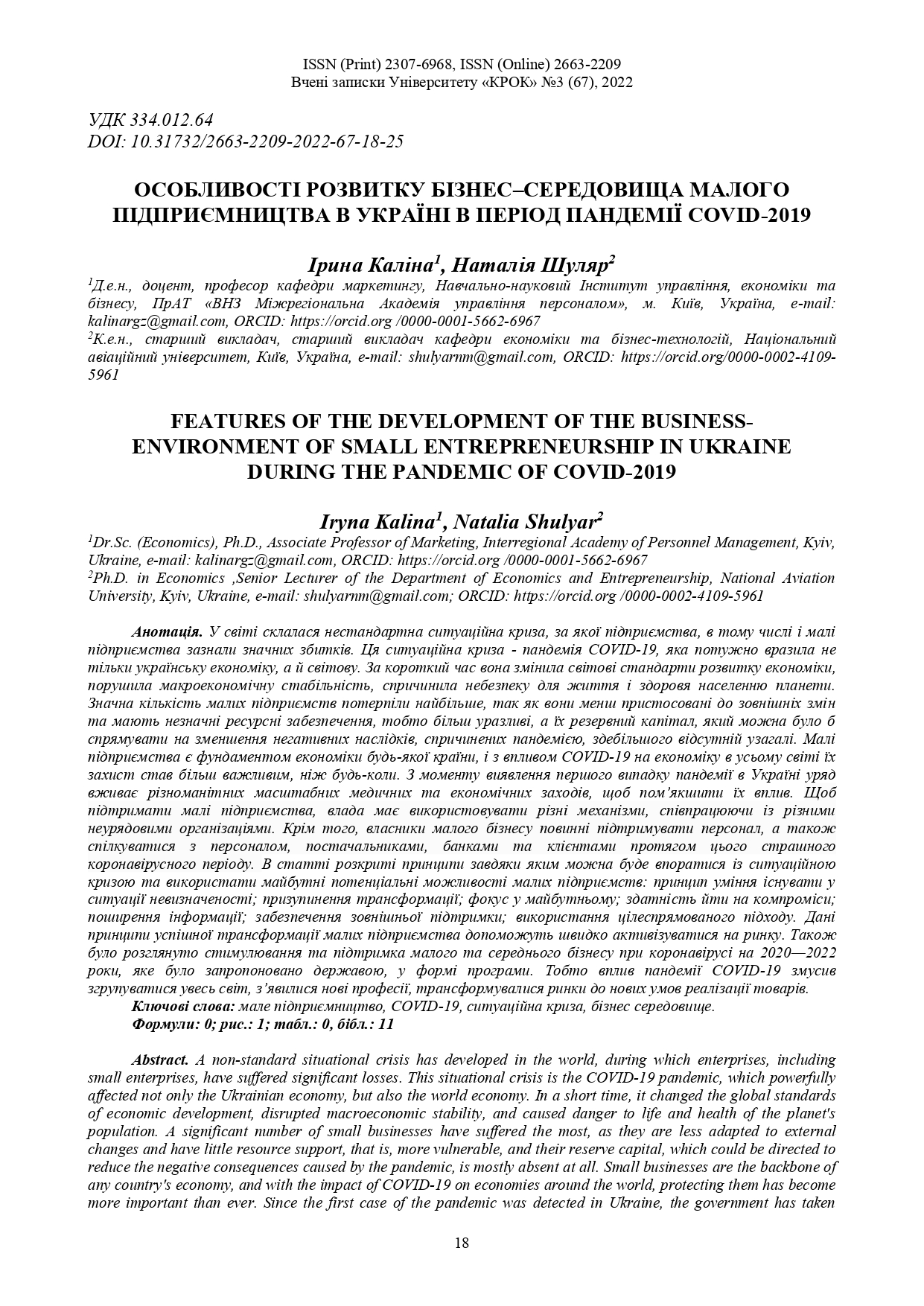FEATURES OF THE DEVELOPMENT OF THE BUSINESS-ENVIRONMENT OF SMALL ENTREPRENEURSHIP IN UKRAINE DURING THE PANDEMIC OF COVID-2019
DOI:
https://doi.org/10.31732/2663-2209-2022-67-18-25Keywords:
small business, COVID-19, situational crisis, business environmentAbstract
A non-standard situational crisis has developed in the world, during which enterprises, including small enterprises, have suffered significant losses. This situational crisis is the COVID-19 pandemic, which powerfully affected not only the Ukrainian economy, but also the world economy. In a short time, it changed the global standards of economic development, disrupted macroeconomic stability, and caused danger to life and health of the planet's population. A significant number of small businesses have suffered the most, as they are less adapted to external changes and have little resource support, that is, more vulnerable, and their reserve capital, which could be directed to reduce the negative consequences caused by the pandemic, is mostly absent at all.
Small businesses are the backbone of any country's economy, and with the impact of COVID-19 on economies around the world, protecting them has become more important than ever. Since the first case of the pandemic was detected in Ukraine, the government has taken various large-scale medical and economic measures to mitigate its impact. In order to support small businesses, the government should use various mechanisms, cooperating with various non-governmental organizations. In addition, small business owners must support staff and communicate with staff, suppliers, banks and customers during this dire coronavirus period.
The article reveals the principles by which it will be possible to cope with the situational crisis and use the future potential opportunities of small enterprises: the principle of the ability to exist in a situation of uncertainty; suspension of transformation; focus in the future; the ability to make compromises; distribution of information; provision of external support; using a targeted approach. These principles of successful transformation of small enterprises will help to quickly become more active in the market. Stimulation and support of small and medium-sized businesses during the coronavirus for 2020-2022, which was proposed by the state in the form of a program, was also considered. That is, the impact of the COVID-19 pandemic forced the whole world to group together, new professions appeared, markets were transformed to new conditions for the sale of goods.
Downloads
References
Васюта В., Житник О. (2021). Особливості діяльності середнього та малого бізнесу в умовах пандемії COVID-19. Економіка та суспільство, (33). URL: https://doi.org/10.32782/2524-0072/2021-33-40 (дата звернення: 17.02.2022)
Гейко Т. Ю. Пріоритети розвитку підприємництва в Україні в умовах пандемії COVID-19 та в посткарантинний період. Вісник соціально-економічних досліджень: зб. наук. праць. Одеса: Одеський національний економічний університет. 2020. № 2 (73). С. 62–71. URL: http://journals.uran.ua/vsed_oneu/article/view/219796/219516 (дата звернення: 03.06.2022)
Красота О.В., Кір’єв І.С. Особливості розвитку малого підприємництва в умовах порушення макроекономічної стабільності. Ефективна економіка. Київ, 2021. №2. URL: http://www.economy.nayka.com.ua (дата звернення: 05.06.2022).
Лук’янова Н., Зайцева О. Пандемія коронавірусу: правові механізми захисту трудових та соціальних прав працівників. 2021. URL: http://rv.dsp.gov.ua/wp-content/uploads/2021/02/lhsi_pandemya_koronavrusu.pdf (дата звернення: 21.03.2021).
(In Ukrainian)
Постанова Кабінету Міністрів України від 27 травня 2020 р. № 534 «Про затвердження Державної програми стимулювання економіки для подолання негативних наслідків, спричинених обмежувальними заходами щодо запобігання виникненню і поширенню гострої респіраторної хвороби COVID19, спричиненої коронавірусом SARS-CoV-2, на 2020-2022 роки». URL: https://www.kmu.gov.ua/npas/prozatverdzhennya-derzhavnoyi-programi-stimulyuvannya-ekonomiki-534-270520 (дата звернення: 15.02.2021).
Тверська Я., Літвиненко М. (2022). Зміни в стратегії розвитку малого підприємництва у зв’язку зі світовою пандемією COVID-19. Вісник Національного технічного університету "Харківський політехнічний інститут" (економічні науки), (2), 43–47. URL:https://doi.org/10.20998/2519-4461.2021.2.43 (дата звернення: 15.06.2022).
Чуприна Л.В., Юзовицька С.А. Світовий досвід розвитку малого підприємництва та його використання в Україні. Інфраструктура ринку. Вип. 32. 2019. URL: http://www.market-infr.od.ua/journals/2019/32_2019_ukr/41.pdf (дата звернення: 11.04.2021).
Урядовий портал URL: https://www.kmu.gov.ua/news/pidsumki-minsocpolitiki-2020-pidtrimka-pracivnikiv-ta-pidpriyemciv-pid-chas-pandemiyi-covid-19
H.Kryshtal, I. Kalina, N.Shuliar, T.Kapeliushna, M.Martynenko, IngramTrends of development of financial and economic activity of entrepreneurial structures during the period of quarantine restrictions. Naukovyi Visnyk Natsionalnoho Hirnychoho Universytetu, 2022, № 1, pp. 139-144 (Scopus)
Stephan Ute, Zbierowski Przemyslaw, Hanard Pierre-Jean. Entrepreneurship and Covid-19: Challenges and Opportunities. London : King's College London, 2020. 30 p.
Chunguang Bai, Matthew Quayson, Joseph Sarkis. COVID-19 pandemic digitization lessons for sustainable development of micro-and small- enterprises. Sustainable Production and Consumption. Volume 27, July 2021, Pages 1989-2001

Downloads
Published
How to Cite
Issue
Section
License
Copyright (c) 2022 Ірина Каліна, Наталія Шуляр

This work is licensed under a Creative Commons Attribution 4.0 International License.

